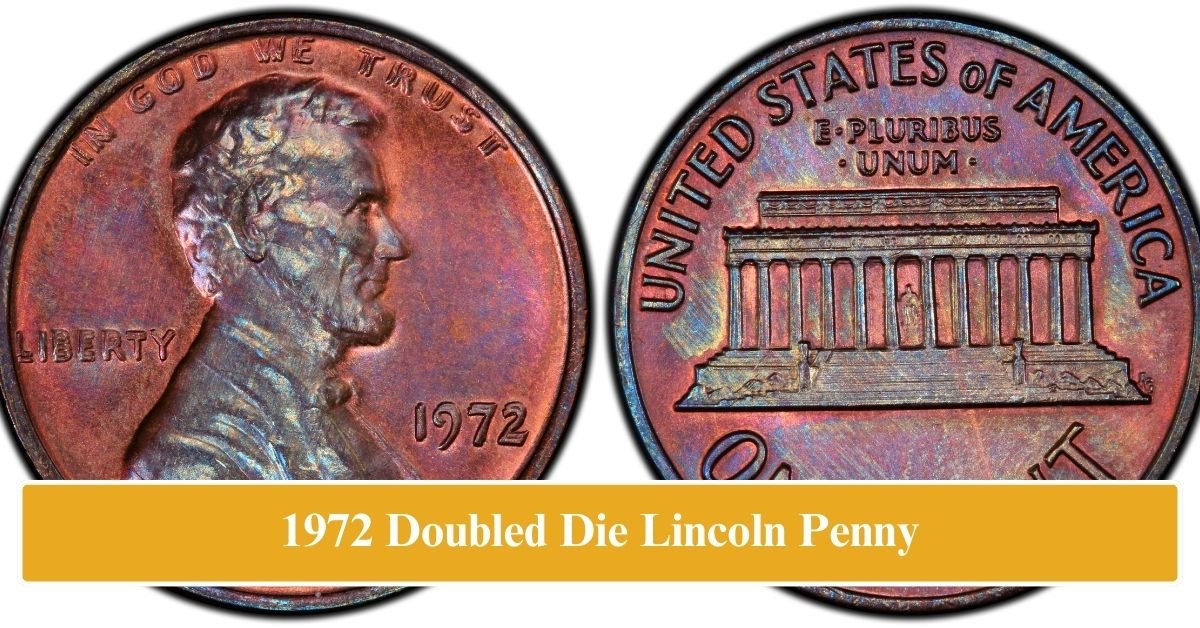The 1972 Doubled Die Lincoln Penny is a captivating piece of numismatic history that continues to draw intrigue from collectors worldwide. Known for its distinct doubling on the obverse, this penny holds historical significance and substantial monetary value. With its origins dating back to the minting process in the early 1970s, this coin is a testament to the charm of minting imperfections. In pristine condition, the coin’s value can exceed $1,000, making it a prized possession in the numismatics community. This rare artifact is more than just a coin; it’s a tangible piece of history. Its allure is heightened by its unique doubling, rarity, and connection to a fascinating era in U.S. minting history.
Unique Doubling
The defining characteristic of the 1972 Doubled Die Lincoln Penny is the unmistakable doubling on the obverse side. This error prominently affects the inscriptions “LIBERTY,” “IN GOD WE TRUST,” and the date, creating a striking visual effect easily detectable under magnification. Among the more than 20 known varieties of doubled dies from 1972, the “FS-101” designation is the most coveted due to its pronounced doubling.
This doubling error occurred due to a misalignment in the die during the minting process. It’s a fascinating anomaly resulting from the mint’s manual die-setting process, which leaves behind a legacy of precision and occasional human error.
Rarity and Value
The rarity of this coin stems from the limited number of errors that escaped into circulation. While millions of 1972 pennies were minted, only a small percentage bear this unique doubling error. This rarity significantly enhances its value, especially in uncirculated condition. Circulated coins generally fetch $100 to $300, while uncirculated specimens can command prices exceeding $1,000 at auctions or private sales.
A few other doubled die coins are renowned among collectors, including the 1955 Doubled Die Lincoln Penny, which is valued between $1,000 and $17,000, and the 1969-S Doubled Die Lincoln Penny, with prices ranging from $40,000 to $75,000. These coins are testament to the enduring appeal of minting errors.
Identifying the Coin
Identifying a 1972 Doubled Die Lincoln Penny requires a keen eye and proper tools. A magnifying glass or loupe is indispensable for spotting the doubling error. Focus on the obverse details, particularly:
- “LIBERTY”
- “IN GOD WE TRUST”
- The Date (1972)
The coin’s composition—predominantly copper with traces of zinc and tin—matches that of other pennies from the era. However, the doubled inscriptions make this coin a standout.
Key Comparison Table
| Coin Name | Year | Doubling Feature | Value Range |
|---|---|---|---|
| 1972 Doubled Die Lincoln | 1972 | Obverse Text | $100 – $1,000+ |
| 1955 Doubled Die Lincoln | 1955 | Obverse Text | $1,000 – $17,000+ |
| 1969-S Doubled Die Lincoln | 1969 | Obverse Text | $40,000 – $75,000+ |
| 1983 Doubled Die Lincoln | 1983 | Reverse Text | $250 – $3,000+ |
| 1995 Doubled Die Lincoln | 1995 | Obverse Text | $20 – $50+ |
| 1943 Copper Penny | 1943 | Entire Coin | $100,000 – $250,000+ |
| 1970-S Small Date Lincoln | 1970 | Date Font | $35 – $2,500+ |
Historical Significance
The 1972 Doubled Die Lincoln Penny is more than just an error coin; it represents a snapshot of the minting challenges and techniques of its time. These anomalies capture the human element in what is often seen as a mechanized process, offering collectors a chance to own a piece of history.
FAQ’s
A rare coin with noticeable doubling on the obverse inscriptions, valued for its uniqueness.
Circulated examples range from $100 to $300; uncirculated coins exceed $1,000.
Look for distinct doubling on “LIBERTY,” “IN GOD WE TRUST,” and the date under magnification.
Only a small fraction of 1972 pennies exhibit the doubling error, making it highly collectible.
Yes, such as the 1955 and 1969-S Doubled Die Lincoln Pennies, worth thousands of dollars.

